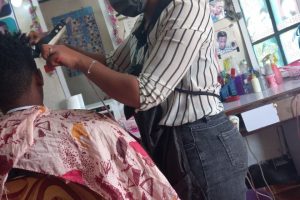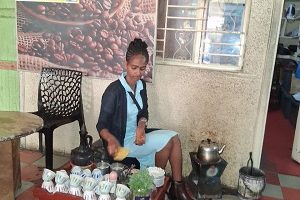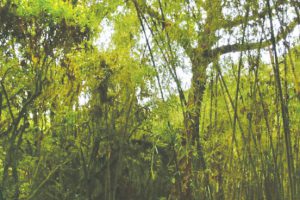
Traditional music in Ethiopia dates back to the ancient times. Ethiopian traditional music is highly interconnected with the life of people in the rural parts of the country who employed it to motivate them in the daily activities of farming, weeding, weaving … etc, according to Deputy Head at Addis Ababa Culture Art and Tourism Bureau Sertse Fresibhat, on his part said that.
Founder of Jazz Music in Ethiopia since 55 years ago, Mulatu Astatkie said that Ethiopia is home to four types of indigenous music scales or Qegnet namely Bati, Anchi Hoye, Ambassel, and Tizita. The music scales are presumed to have originated in Wollo, Amhara Regional State though the exact person who developed them is not clearly known.
This shows that the sector is not given adequate attention and still they do not known our resources. In fact, the traditional music system sometimes they get other countries without legal agreement and countries changes to registered them home as counted as own resources.
The traditional music is characterized by its use of traditional music instruments like flute, masinqo, lyre, harp, and drums. Each instrument has their own unique behavior started from the material and play sounds. However, either the making or playing of all instruments need special expertise. Well versed makers and players of the instruments are found in the highland and lowland parts the rural parts of the country.
Particularly, flute is usually played by cowboys and farm attendants who atop a wooden tower and watch birds from eating crops. Lyre is used by someone who praises a hero, Masinqo a kind of violin is used for inspiring the motivation, and harp and drum, on the other hand, are frequented during religious service.
“Lack of experience in the sector is the major problem in the country which hinders traditional music development as institutionalized,” Mulatu noted.
Particularly, music is a science and an art. Therefore, the sector needs special experts who know about the whole behavior of art in general and music in particular. It means that an expert should possess deeper knowledge about music to relate each traditional music with dancing and the instruments. In this regard, the musical instruments namely, Kirar (lyre), Masniqo, flute, harp (Begena) are differing from each other depending on their purpose.
As to him, he has been passing many years in his staying on music area starting from the reign of Emperor Haile Selassie I regime to the present and observed the overall activities of the musical sector. However, the musical sector still undeveloped as it was expected.
Institutionalizing, conducting researches, and the like are playing indispensable role for developing Ethiopian traditional music and helpful for next generations.
According to Sertse, traditional music reflects the overall behavior of the societies or symbols of the society across the nation. However, it is not institutionalized and there was no orchestra system, as people used to enjoy music through the performance of individual singers and players.
When Italy invaded the country, they opened modern theatre and cinema like Y’hager Fiker Theater in order to protect the culture and art thereby creating musical experts. Particularly, Beshah Tekelmariam, who played indispensable role is musical instruments like flute, Masinqo, lyre, harp, and drum gathered and played together as well as comes to imitation there with changing orchestra.
In addition to this, the art was also inspired during Emperor Haile Selassie I regime with the opening of Emperor Haile Selassie I Theater. The theatre was opened with the help of an Austrian citizen who conducted research on Ethiopian traditional music and trained people. This was fruitful in the making of famous artists like Awulachew Dejene, Abebe Tesema, and Lemma Gebrehiwot. Thirdly, a traditional club was also opened in Addis Ababa University with the name Orchestra Ethiopia by Tesfaye Lemma. He trained musical experts like Shanbel Belayeneh, Elias Tebabal, and Kudi Ujilu. Tesfaye is also successful as he introduced Ethiopian music to USA for the first time by establishing Tikure Abay culture club, he added.
On the other hand, during the period of Derg regime, various traditional art clubs formed in different parts of the country have added momentum to the development of traditional music. Such clubs include Gish Abay Cultural Club, Wollo Lalibela Cultural Club, Gonder Fasiledes Cultural Club, and Jimma Bursa Cultural Club, Tigary region, among others.
Particularly, People to People Culture musical club were formed in this regime and introduced Ethiopian traditional music through event based for close to 48 countries.
The classic and father of Jazz, Mulatu Astatkie was persisted in the time and he improved Ethiopian musical instruments. However, following to governmental change, in the period of EPRDF, the sector somehow seriously challenged, simply, destroyed. In this regard, some clubs are formed but they are private movement, rather than group make or governmental based. The clubs were formed in some places like school area and Anti HIV/AIDS Club that were formed following the outbreak of the pandemic while the source of income has been obtained from donors. The main aims of such type of clubs, raising social awareness that how to combating HIV through entertaining.
Currently, youths have started a unique style of playing traditional music. For example, Addis Alemayehu, the new phenomena who plays masinqo uniquely. It deduced that unlike the Haile Selassie regime and Derg regime, the musical art does not institutionalize during the past more than two decades. But, individual, some of them raise from Ethiopian Orthodox Tewahedo Church, still playing traditional music instruments by their own motivation.
Now a days, the modern music start to play by traditional instruments, which has significance for expanding more, experiments, introduced to the world, and the like.
Due attention to the sector, policy based structure, and institutionalizing are playing vital role for inspiring the art sector in general and music in particular. In this regard, the Bureau carrying out deferent activities that how to forming the best structure of traditional music therewith modern system in the coming few years, Seretse elaborated.
The Ethiopain Herlad Jun 20, 2020
BY MESERET BEHAILU




